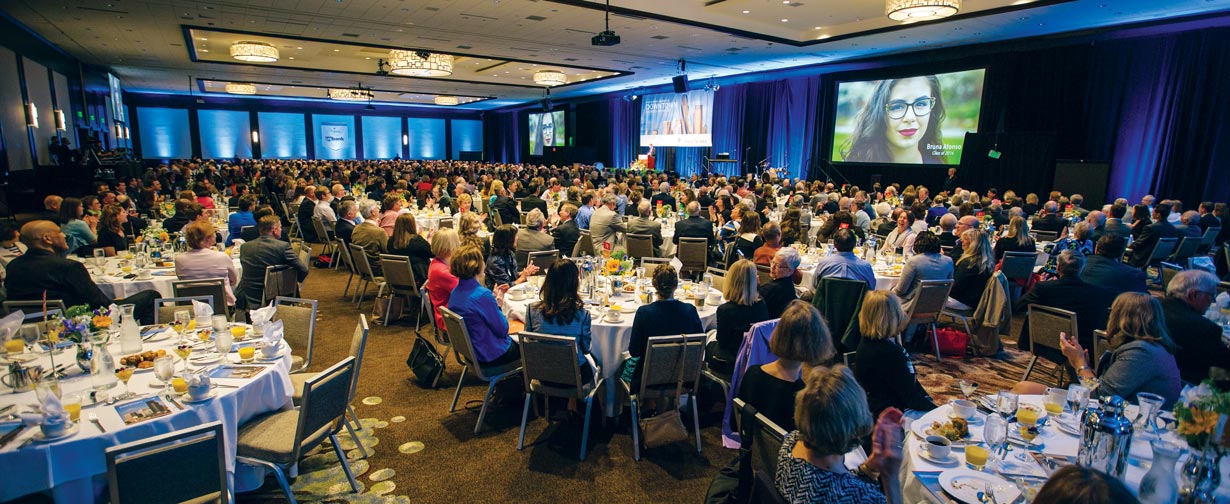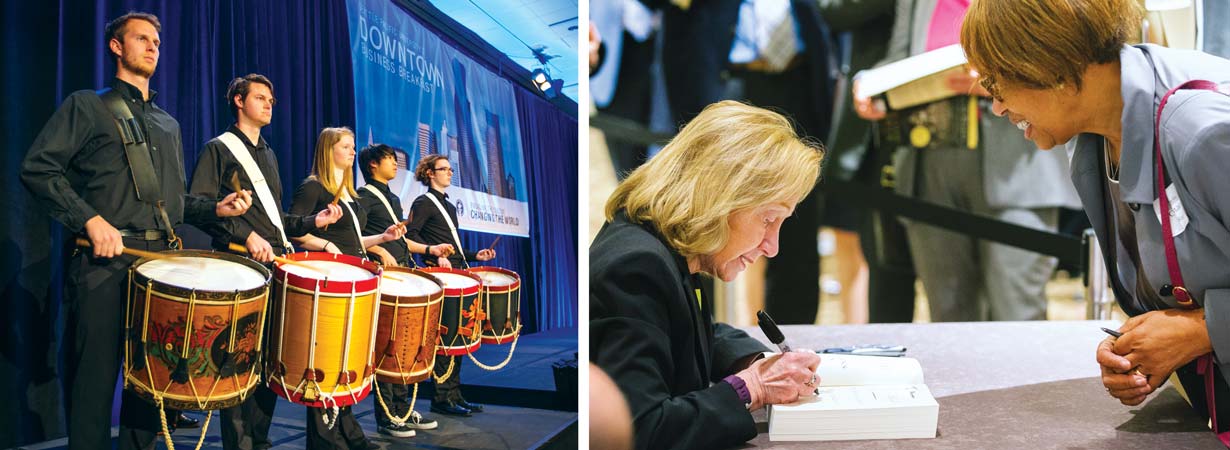The City Urban Perspectives
Ghosts of Primaries Past
Presidential historian addresses SPU’s 20th annual Downtown Business Breakfast
By Dusty Henry | Photos by Mike Siegel
 Doris Kearns Goodwin spoke on the 2016 election to nearly 1,000 guests at this year’s Downtown Business Breakfast (above) at the Seattle Westin.
Doris Kearns Goodwin spoke on the 2016 election to nearly 1,000 guests at this year’s Downtown Business Breakfast (above) at the Seattle Westin.
To hear Doris Kearns Goodwin put it, the 2016 presidential election isn’t the craziest our nation has had. It is, however, one of the most unique. On April 8, 2016, the Pulitzer Prize-winning author and presidential historian addressed Seattle business leaders at Seattle Pacific University’s 20th annual Downtown Business Breakfast to discuss the current political climate, something that’s been dominating news broadcasts and contentious Facebook feeds for months.
 Doris Kearns Goodwin
Doris Kearns Goodwin
Goodwin, who has chronicled the lives of presidents from Abraham Lincoln to Lyndon B. Johnson, is known for approaching current politics with an eye toward the past. Almost right away she spoke about the question she most often gets these days: Has American history ever seen a candidate like hopeful Republican nominee Donald Trump? Someone who has never held political office or been a military figure and who she says "harnesses public anxieties?"
“The answer is: Not really have we seen a character like Trump,” she said, comparing his rise to the animosity centered around economic advancements prior to the 20th century with the Industrial Revolution and immigration. “While the potent mix of anger, anxiety, and fear that has fueled Trump’s moment has echoes in the past … I think it is taking changes in both our political system and the media to create the Trump phenomenon, even if that mix of economic situations has some parallel.”
Goodwin took time to look back at the presidential primaries of 1912 between William Taft and Theodore Roosevelt, but more importantly between the conservative and progressive wings of the Republican party. By Goodwin’s account, it was an even more contentious race than today’s, with Taft and Roosevelt screaming at one another and devolving into name-calling, as violence broke out at state conventions.
 The SPU Rope Drum Corps performed, and Goodwin signed books following the event. She also spoke to more than 1,300 attendees the previous evening on campus for a moderated discussion.
The SPU Rope Drum Corps performed, and Goodwin signed books following the event. She also spoke to more than 1,300 attendees the previous evening on campus for a moderated discussion.
“I’m telling you all this so we don’t feel so bad about what’s going on,” she joked. As she moved on to the issues of today, Goodwin chastised campaign financing and the Citizens United Supreme Court Case, as well as the role journalists have taken in the electoral process — profiting off of headlines and narratives rather than giving thoughtful concern over the temperament and political experience of candidates.
Goodwin also discussed her love for history, stemming from her father asking her to track the scores of Brooklyn Dodgers games for him as she listened to them on the radio. Later in life she would become a White House fellow under President Johnson and later was hired on as his Oval Office assistant.
She ended her talk by recalling that childhood love of baseball and honoring the memory of her late father. Watching the Boston Red Sox with her sons at Fenway Park reminds her of watching the games with her father. For her, it links her sons to his memory.
“Our families and the public figures we have respected in history ... really can live on just as long as we pledge to tell and to retell the stories of their lives,” she said as she closed her lecture.
Read the Response exclusive interview with Doris Kearns Goodwin.
